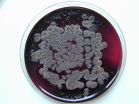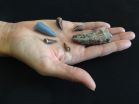(Press-News.org) The literature describes Listeria as ubiquitous bacteria with widespread occurrence. Yet they only become a problem for humans and animals when they contaminate food processing facilities, multiply, and enter the food chain in high concentrations. An infection with Listeria monocytogenes can even be fatal for humans or animals with weakened immune systems.
Listeria in soil or water are not dangerous
"Listeria in soil or water represent a relatively low risk to humans," explains study director Beatrix Stessl. "The concentrations are too low. The aim of our study was to ascertain where Listeria occur and which species and genotypes were prevalent there." Martin Wagner, head of the Institute of Milk Hygiene, adds: "This information can help us to better understand the mechanisms through which these bacteria are spread."
Flooding favours Listeria contamination
Over a period from 2007 to 2009, first author Kristina Linke and her colleagues collected nearly 500 soil and 70 water samples from three Austrian regions: the eastern Alps, the Donauauen National Park adjacent to the river Danube, and Lake Neusiedl. The study regions involved natural, non-agricultural areas. Of all samples, 30 percent were detected positive for Listeria. Of these, 6 percent were contaminated with Listeria monocytogenes, the only species that is potentially dangerous for both humans and animals. L. monocytogenes was detected especially near the rivers Schwarza and Danube. Particularly high rates of the bacteria in soil and water samples were registered in September 2007 during extensive flooding in the region.
In most regions, the researchers found only Listeria that are non-pathogenic to humans.
The species Listeria ivanovii, which is potentially dangerous for animals, was found mainly in mountainous regions where the bacteria are presumably excreted by wildlife species. The non-pathogenic Listeria seeligeri was most frequently isolated in the region around Lake Neusiedl, which is likely explained by the waterfowl population in this area.
No Listeria were isolated in high-altitude mountain regions. The researchers explain the greater contamination at lower altitudes with the proximity to farms, agricultural land and the urban environment.
Antibiotic-resistant Listeria in soil
Although Listeria that contaminate food are generally not considered to be resistant to antibiotics, Stessl and her team found several Listeria strains in soil samples which resisted treatment with antibiotics. The bacteria have developed resistance. Stessl sees the possible causes as follows: "A number of soil microorganisms, such as fungi, naturally produce antibiotics. Listeria which are constantly exposed to these substances in the soil probably develop resistance. We believe, however, that the development of particularly high-resistant strains of Listeria can be explained by the proximity to agricultural land and the urban environment."
INFORMATION:
Service:
The article „Reservoirs of Listeria species in three environmental ecosystems", by Kristina Linke, Irene Rückerl, Katharina Brugger, Renata Karpiskova, Julia Walland, Sonja Muri-Klinger, Alexander Tichy, Martin Wagner und Beatrix Stessl was published in the Journal Applied and Environmental Microbiology. doi: 10.1128/AEM.01018-14 http://aem.asm.org/content/80/18/5583.long
About the University of Veterinary Medicine, Vienna
The University of Veterinary Medicine, Vienna in Austria is one of the leading academic and research institutions in the field of Veterinary Sciences in Europe. About 1,300 employees and 2,300 students work on the campus in the north of Vienna which also houses five university clinics and various research sites. Outside of Vienna the university operates Teaching and Research Farms. http://www.vetmeduni.ac.at
Scientific Contact:
Dr. Beatrix Stessl
Institute of Milk Hygiene, Milk Technology and Food Science
University of Veterinary Medicine Vienna (Vetmeduni Vienna)
T +43 1 25077-3502
beatrix stessl@vetmeduni.ac.at
Released by:
Susanna Kautschitsch
Science Communication / Public Relations
University of Veterinary Medicine Vienna (Vetmeduni Vienna)
T +43 1 25077-1153
susanna.kautschitsch@vetmeduni.ac.at
Investigating the 'underground' habitat of Listeria bacteria
2014-09-29
ELSE PRESS RELEASES FROM THIS DATE:
Trial shows trastuzumab should remain as standard of care for HER2-positive breast cancer
2014-09-29
JACKSONVILLE, Fla., Sept. 29, 2014 — Analysis of more than 8,000 women who participated in the world's largest study of two treatments for HER2-positive breast cancer reinforces other findings from the clinical trial showing that trastuzumab (Herceptin) should remain the standard of care for this cancer, says a Mayo Clinic researcher.
This study, being presented at the European Society for Medical Oncology (ESMO) 2014 Congress in Madrid, reveals that when used as a single HER2-targeted therapy in addition to standard chemotherapy, trastuzumab offers a better outcome than ...
Tooth serves as evidence of 220 million-year-old attack
2014-09-29
At the beginning of the age of dinosaurs, gigantic reptiles—distant relatives of modern crocodiles—ruled the earth. Some lived on land and others in water and it was thought they didn't much interact. But a tooth found by a University of Tennessee, Knoxville, researcher in the thigh of one of these ancient animals is challenging this belief.
Stephanie Drumheller, an earth and planetary sciences lecturer, and her Virginia Tech colleagues Michelle Stocker and Sterling Nesbitt examined 220-million-year-old bite marks in the thigh bones of an old reptile and found evidence ...
A molecular mechanism involved in cellular proliferation characterized
2014-09-29
Researchers from Guillermo Montoya's team at the Spanish National Cancer Research Centre (CNIO), in collaboration with Isabelle Vernos' Group from the Centre for Genomic Regulation (CRG), have uncovered the molecular interaction between TACC3 and chTOG, key proteins in forming the internal cellular framework that enables and sustains cell division. Published today in Nature Communications, the observations may help to optimise current oncological therapies specifically designed to fight against this framework, named by the scientific community as microtubules.
KEY MOLECULES ...
New method to motivate students to reduce energy consumption
2014-09-29
The research found that a combination of a real-time feedback system together with a human energy delegate in eight halls of residence resulted in a reduction of 37% in energy consumption when compared to normal consumption. The savings were 1360.49 kWh, which is equivalent to a reduction of 713.71 kg of CO2 over four weeks.
In contrast, another eight halls, exposed only to the real-time feedback and a weekly email alert, resulted in saw a 3.5% reduction in energy consumption.
Student's energy-use behaviour is complex as they cannot easily identify how much electricity ...
Dolphins are attracted to magnets
2014-09-29
Dolphins are indeed sensitive to magnetic stimuli, as they behave differently when swimming near magnetized objects. So says Dorothee Kremers and her colleagues at Ethos unit of the Université de Rennes in France, in a study in Springer's journal Naturwissenschaften – The Science of Nature. Their research, conducted in the delphinarium of Planète Sauvage in France, provides experimental behavioral proof that these marine animals are magnetoreceptive.
Magnetoreception implies the ability to perceive a magnetic field. It is supposed to play an important role in how some ...
Human trafficking, an invisible problem
2014-09-29
This news release is available in Spanish. This study compares the existing legislation on this subject in European countries and analyzes both the level of protection afforded to the victims and the measures taken to avoid this crime; in addition, it proposes of code of best practices that favors the enactment of new European guidelines aimed at ending this activity. Specifically, it shows that one of the first obstacles to change is that the magnitude of the problem is not known, points out one of the authors of the report, Begoña Marugán Pintos, of the department ...
Evolutionary biology: It's not just for textbooks anymore
2014-09-29
Solving global challenges in food security, emerging diseases and biodiversity loss requires evolutionary thinking, argues a new study published online in Science Express that was co-authored by Bruce Tabashnik of the University of Arizona College of Agriculture and Life Sciences.
For the first time, an international team of nine scientists has reviewed progress in addressing a broad set of challenges in agriculture, medicine and environmental management using approaches that consider evolutionary histories and the likelihood of rapid adaptation to human activities.
The ...
IMPRESS trial data on continuing tyrosine kinase inhibitor therapy after resistance development in lung cancer reported
2014-09-29
Patients whose lung cancer has developed resistance to the drug gefitinib experience no statistically significant improvement in progression-free survival from continued treatment with the drug in addition to chemotherapy, a phase III trial presented at the ESMO 2014 Congress has shown.
The IMPRESS trial is a randomised phase III study that compared continuation of gefitinib in addition to chemotherapy against chemotherapy alone in patients with lung cancer that carried mutations in the EGFR cell surface receptor.
Gefitinib is a type of drug known as a tyrosine kinase ...
Pertuzumab adds 16 months survival benefit to trastuzumab and chemo treatment for HER2-positive breast cancer
2014-09-29
Patients with HER2-positive breast cancer that has spread to other parts of their body live around 16 months longer if treated with a combination of pertuzumab, trastuzumab and chemotherapy compared to those treated with trastuzumab and chemotherapy alone, updated results from the CLEOPATRA study reveal.
CLEOPATRA was a pivotal phase III study where researchers evaluated the safety and efficacy of pertuzumab, trastuzumb and chemotherapy in 808 patients with previously untreated HER2-positive metastatic breast cancer. HER2-positive metastatic breast cancer has historically ...
Adding cediranib to chemo improves progression-free survival for meta or recurrent cervical cancer
2014-09-29
For patients with cervical cancer that has recurred after treatment or has spread elsewhere in the body, adding the experimental drug cediranib to standard chemotherapy improves tumour shrinkage and adds a modest improvement in progression-free survival, researchers report at the ESMO 2014 Congress in Madrid.
In Europe, about 70% of patients with cervical cancer are cured by either surgery or chemo-radiotherapy. Those patients with recurrent or secondary cancer have a very poor outlook. Only about 20-30% have tumour shrinkage after conventional chemotherapy and survival ...



